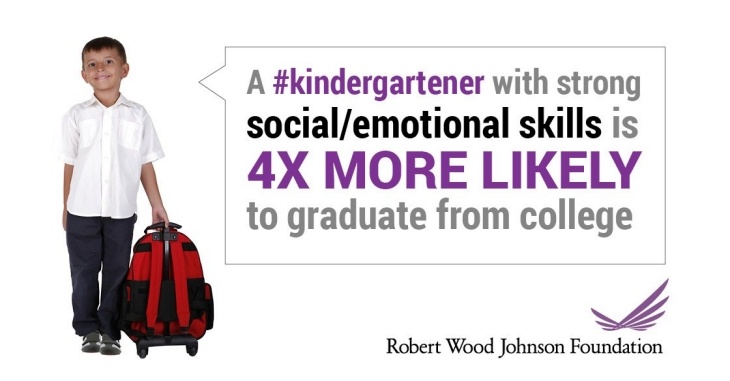
Did you know that kindergarten students who show high social competence (or good social skills) are 46% more likely to have a full-time job at the age of 25? In 2015, the Robert Wood Johnson Foundation published results from a fascinating long-term study measuring social competence for a group of 753 kindergartners and evaluated outcomes for these same students 20 years later. What they found was startling:
“For every one-point increase on the 5-point scale in a child’s social competence score in kindergarten, he/she was:
- Twice as likely to attain a college degree in early adulthood;
- 54% more likely to earn a high school diploma; and
- 46% more likely to have a full-time job at the age of 25.”
And on the flip side, “for every one-point decrease in a child’s social competence score in kindergarten, he/she had:
- 67% higher chance of having been arrested by early adulthood;
- 82% higher rate of recent marijuana usage; and
- 82% higher chance of being in or on a waiting list for public housing.”
Social emotional skills will help students be better prepared for college and careers, and it’s clear that the earlier they are practiced and mastered, the more likely it is that students will be successful in both school and the workforce.
Research Studies For Centervention Programs

Social-Emotional Learning Amidst COVID-19 School Closures
NEW (June 2021): This study was with a group of 823 third-grade students from 37 classrooms in California. “The results indicated that the Adventures program was positively and significantly associated with gains in students’ interpersonal strength as measured by BERS-2 (effect size=0.39), communication skills as measured by SSBI (effect size=0.29), pro-social goals and solutions to achieve positive consequences as measured by SELweb (effect size >=0.33), and social skills related to communication, cooperation, empathy, emotion regulation, impulse control, and social initiation as measured by Zoo U (effect size >=0.61).” Summary or Full study >

Game-Based Socio-Emotional Skills Assessment: A Comparison Across Three Cultures
A research team used Hall of Heroes to measure and compare social and emotional skills of adolescent female students matched for age across Malaysia, South Africa, and the United States, and found significant correlations between social and emotional skills for all cultures. Full study >

Establishing the criterion validity of Zoo U’s social emotional skills assessment for school-based outcomes
In a study of 270 students, those who demonstrated higher social competence when problem solving Zoo U’s virtual situations were significantly more likely to exhibit positive social, behavioral, and academic adjustment, while children who performed poorly on Zoo U were significantly more likely to experience negative school-based outcomes. Full study >
Additional Centervention Program Research Studies
- SS GRIN: The acceptability and efficacy of an intelligent social tutoring system (Computers in Education)
- Zoo U: A Stealth Approach to Social Skills Assessment in Schools (Advances in Human-Computer Interaction)
- Hall of Heroes: A Digital Game for Social Skills Training with Young Adolescents (International Journal of Computer Games Technology)
- Enhancing Children’s Social Emotional Functioning Through Virtual Game-Based Delivery of Social Skills Training (Journal of Child and Family Studies)
- Toward effective game-based social skills tutoring for children: an evaluation of a social adventure game (ResearchGate)
General Social and Emotional Research Studies
- Early Social-Emotional Functioning and Public Health: The Relationship Between Kindergarten Social Competence and Future Wellness (American Journal of Public Health)
- The Impact of Enhancing Students’ Social and Emotional Learning: A Meta-Analysis of School-Based Universal Interventions (Child Development)
- Ready To Be Counted: The Research Case for Education Policy Action on Non-Cognitive Skills (Transforming Education)
Centervention Research Partners


